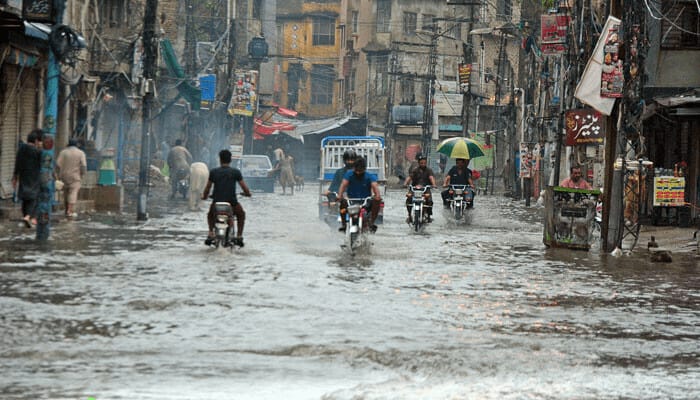Pakistan Issues Weather Alert for Heavy Rains, Flash Floods Till July 10
Islamabad (News desk)Pakistan Weather Alert: NDMA Issues Monsoon and Flash Flood Advisory (6–12 July
The National Emergencies Operation Center (NEOC) of the National Disaster Management Authority (NDMA) has released an impact-based weather advisory in light of expected monsoon activity and a strong westerly wave, forecasted to affect various parts of the country from July 6 to 10. A heightened risk of flash floods in northern regions is also expected between July 7 and 12.
Rainfall Forecast by Region:
Islamabad & Punjab: Scattered rain and thunderstorms are expected in Islamabad and cities like Rawalpindi, Jhelum, Chakwal, Attock, Sargodha, Mianwali, Khushab, Faisalabad, Lahore, Gujrat, Gujranwala, Kasur, and Okara from July 6–10. Northern and central Punjab may witness moderate to heavy rainfall, while southern parts such as Multan, Bahawalpur, Rahim Yar Khan, and Dera Ghazi Khan may see light to moderate showers.
Khyber Pakhtunkhwa: Heavy rainfall is expected in Dir, Swat, Chitral, Kohistan, Malakand, Mansehra, Abbottabad, Peshawar, Mardan, and other adjoining districts, potentially causing flash floods and landslides.
Gilgit-Baltistan & AJK: Moderate to heavy rain, especially during evenings and nights, is predicted in Gilgit, Skardu, Hunza, Diamir, Muzaffarabad, Neelum Valley, and surrounding regions, increasing the risk of flash flooding and road blockages.
Sindh: Light to moderate rainfall is likely in Karachi, Hyderabad, Sukkur, Mirpur Khas, and other areas, while heavier downpours are expected in Ghotki, Khairpur, Larkana, Dadu, and Jacobabad, possibly leading to urban flooding and infrastructure strain.
Balochistan: Scattered to heavy rain is forecasted in Quetta, Zhob, Kalat, Khuzdar, and surrounding districts, which may result in waterlogging, traffic delays, and damage to poorly built structures due to lightning and strong winds.
NDMA has urged citizens to avoid unnecessary travel, secure belongings, and stay indoors during intense we
ather spells. Tourists should avoid high-risk areas, especially mountainous and flood-prone zones. Local authorities are instructed to ensure the availability of emergency response teams, clear drainage systems, and enhance public communication. Drivers are advised to avoid waterlogged routes and underpasses. Emergency services remain on standby for potential rescue and relief operations.





Comments are closed, but trackbacks and pingbacks are open.